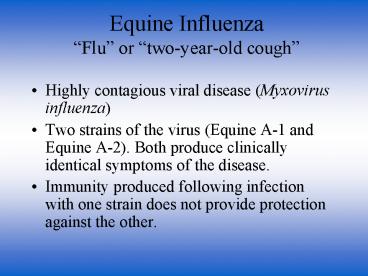Equine Influenza - PowerPoint PPT Presentation
1 / 7
Title:
Equine Influenza
Description:
Equine Influenza Flu or two-year-old cough Highly contagious viral disease (Myxovirus influenza) Two strains of the virus (Equine A-1 and Equine A-2). – PowerPoint PPT presentation
Number of Views:1466
Avg rating:3.0/5.0
Title: Equine Influenza
1
Equine InfluenzaFlu or two-year-old cough
- Highly contagious viral disease (Myxovirus
influenza) - Two strains of the virus (Equine A-1 and Equine
A-2). Both produce clinically identical symptoms
of the disease. - Immunity produced following infection with one
strain does not provide protection against the
other.
2
- Can affect horses of all ages, however most often
seen in young horses. - Appears suddenly
3
Symptoms of Equine Influenza
- Elevated temperature (102o to 106oF,lasting 1 to
6 days) - Loss of appetite
- Respiratory distress
- Depression
- Muscular weakness and tremors are not uncommon
- Incubation period varies from 2 to 10 days
4
- In some horses there may be swelling of the lower
surface and extremities accompanied by
inflammation of the tendon sheaths. - Watery nasal discharge that may become thick and
yellowish colored. - Lymph glands of the head and neck may become
swollen, can mistake for strangles.
5
- Fatalities from flu are rare, provided horses are
kept at complete rest and the disease does not
become complicated by a secondary bacterial
infection. - Common secondary infections include rhinitis,
laryginitis, pharyngitis, tracheitis, pneumonia
and digestive disturbances. - Prolonged pneumonia may affect the heart,liver
and kidneys.
6
Treatment of Equine Influenza
- Neither antibiotics or sulfa drugs are effective
against the virus, however they may help prevent
secondary bacterial infection. - Adequate rest both during and following the
disease is essential. Failure to provide rest is
responsible for the persistence of symptoms and
chronic coughing (two-year-old cough).
7
Prevention of Equine Influenza
- All horse should be vaccinated (immunized).
- Immunization can be started as early as three
months of age. - Most programs require two doses initially
followed by an annual booster. - High risk horses repeatedly exposed at tracks or
other equine events may be given a booster every
six months.

